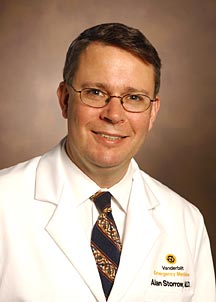
The Department of Emergency Medicine has been named to receive one of the nation’s first training grants in emergency medicine from the National Institutes of Health.
The $3.5 million grant from the National Heart, Lung and Blood Institute will fund the Vanderbilt Emergency Medicine Research Training program (VEMRT), proposed by co-program directors and principal investigators Alan Storrow and Douglas Sawyer.
The program is a five-year focus on training and mentoring physician-scientists in all aspects of research necessary to prepare them for the challenges associated with translating scientific research into care improvements for acutely ill or injured patients.
Vanderbilt was selected as one of six grant recipients from approximately 30 proposals submitted by the nation’s leading emergency medicine programs.
“Receipt of this grant demonstrates a level of excellence other leading programs in emergency medicine aspire to achieve,” said Jeff Balser, vice chancellor for health affairs and dean of the School of Medicine.
“To be selected for inclusion in this first-ever group speaks to the commitment of the faculty and staff in emergency medicine, and the incredible support throughout our research enterprise for departments to leverage and compete at the highest level for new opportunities in research and training.”
Developing expertise
Although clinically oriented, the VEMRT program will also highlight the importance of collaborating with basic researchers in hypothesizing and designing clinical research. The program will concentrate on developing expertise in four focus areas: acute lung injury, asthma, arrhythmias and acute coronary syndromes and heart failure.
A total of six scholars will participate at any one time, chosen from an applicant pool of clinician-scientists who have completed residency or clinicians with a Ph.D. or equivalent training who show exceptional aptitude for pursuing a career in academic research.
An internal advisory committee chaired by Gordon Bernard will assist in the selection, training and evaluation of scholars as well as evaluation of the program itself. Other members include Robert Dittus, Nancy Brown, William Cooper, Marie Griffin, Tina Hartert, Katherine Hartmann, Alp Ikizler, Louis Muglia and Corey Slovis.
Premier national program
“This training grant serves to formalize Vanderbilt’s Department of Emergency Medicine as one of the premier research programs in the nation,” said Slovis, chair of emergency medicine. “Dr. Storrow and his team have capitalized on many of the medical center’s research strengths, and this award says volumes about Vanderbilt’s incubator status for developing both individuals and entire research programs.”
Storrow and Sawyer have assembled a team of experts in each focus area who are currently engaged in successful academic research and have devoted their careers to training and mentoring new investigators.
These efforts represent areas of critical mass, national recognition, NIH funding and local expertise for Vanderbilt, as well as societal need. They will be bolstered by institutional strengths in biomedical informatics, comparative effectiveness, pharmacogenomics, Vanderbilt’s emergency medicine research infrastructure and continual attraction of a deep, diverse candidate pool.
“While remarkable advances in the diagnosis and management of acute, life-threatening cardiopulmonary and hematologic disorders have occurred in past decades, there is growing national concern that expert emergency medicine clinical investigators who can translate new research findings to practice are insufficient in number,” Storrow said.
“[rquote]It has never been more important to create and maintain a cadre of emergency care physician scientists, given the unprecedented developments at the cellular and molecular level, including knowledge of the human genome.[/rquote]”
This program is in collaboration with the Meharry-Vanderbilt Alliance and is supported by Meharry Medical College.